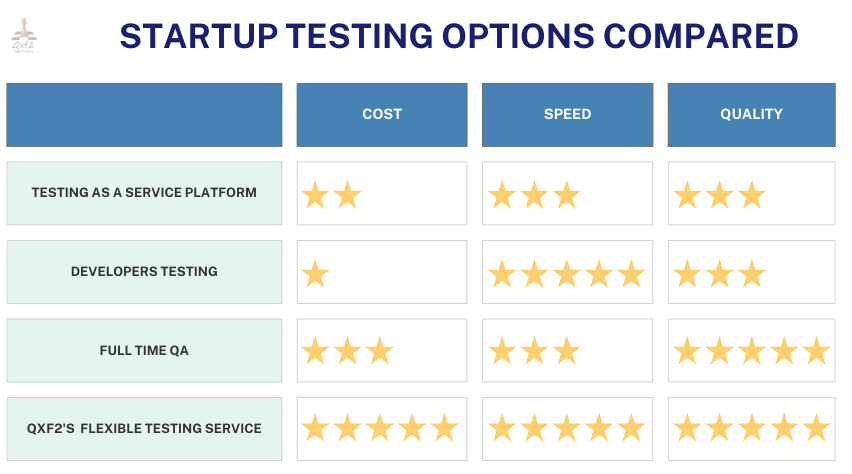Startups face unique challenges in testing their products. Traditional QA approaches often feel too slow, rigid, or expensive for the fast-paced nature of early-stage companies. Qxf2's flexible testing service offers a lightweight, frontloaded QA solution without the complexity or cost of hiring full-time QA. This innovative approach is designed to make testing faster, more efficient, and tailored to the specific needs of early stage companies. It's a service that is not known to many and is rarely offered, addressing challenges that early-stage companies often face. For startups aiming to build high-quality products quickly and cost-effectively, it can be a game-changer.

Startups operate in an environment where speed, cost efficiency, and resource optimization are critical for survival. To meet tight deadlines and budget constraints, they often rely on developers to handle testing or deprioritize it altogether. While this approach helps move quickly in the short term, it can leave the product vulnerable to quality issues, scalability challenges, and missed opportunities for improvement.
Early stage companies often hesitate to prioritize testing due to perceived challenges:
However, neglecting testing early on can lead to significant problems down the line:
Since 2013, Qxf2 has focused exclusively on testing early-stage products, partnering with over a dozen early-stage products. From being the first QA team to laying the foundation for scalable testing, we've supported startups across their growth journey-from seed funding to Series H.
Through this experience, we've observed that traditional QA methods often fail to meet the needs of fast-paced, resource-constrained environments. Developers, tasked with testing, frequently encounter challenges, as they often struggle with testing. This gap drove us to look for solutions that could balance speed, quality, and affordability.
Our answer is a flexible QA solution, a tailored approach designed specifically for startups. By implementing this model across startups, we have seen firsthand how it addresses key pain points: faster feedback loops, cost-effective testing, and a team that seamlessly integrates with development to scale and enhance testing. In this article, we will discuss how this approach compares to traditional QA, the challenges it solves, and why it could be a game-changer for startups striving to stay nimble without sacrificing quality.
Essential Service is a lightweight, frontloaded QA solution designed to provide startups with the testing support they need, without the complexity or cost of hiring full-time QA. Flexible QA means adapting testing efforts to fit the unique demands of your product, providing just the right amount of support when it's needed most.
Here's what we offer:
With a focus on low overhead, empowering your developers, and smooth releases, our QA service evolves alongside your product, making sure it's always ready for the next stage of growth. Visit our Flexible QA Service Offering page for detailed information.
| Approach | Advantages | Disadvantages |
|---|---|---|
| 1. Full-Time QA teams |
|
|
| 2. Developers testing |
|
|
| 3. Testing as a service platform |
|
|
Each of these approaches has its strengths and limitations, but they often fall short of meeting the unique demands of fast-moving startups. This is where fractional or flexible QA services stand out as a game-changing solution.
Striking the right balance between cost, speed, and quality can be challenging for startups. Flexible QA bridges this gap by offering a smarter, adaptable solution that meets these challenges head-on. Here's how this approach benefits startups:

Testing should not be an afterthought for startups. While full-time QA and developer testing have their merits, they come with challenges that startups may struggle to address. Testing-as-a-service platforms can help, but they're not a complete solution. Fractional QA services provide a middle path, offering lightweight, flexible, and cost-effective testing to meet the needs of fast-moving startups without compromising product quality.
Ready to streamline your testing process without the need for full-time QA? Contact us today. This could be the key to balancing speed, quality, and cost in your product's journey.
© Qxf2 Services 2013 -